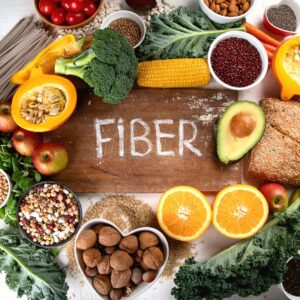The Role of Fiber: Why fiber is crucial for digestive health
When it comes to keeping our digestive systems running smoothly, fiber often doesn’t get the spotlight it deserves. While we tend to focus on vitamins and minerals, fiber is like that reliable friend who always has your back. Let’s dive into what fiber is, the different types, and why it’s essential for our digestive health.
What is Fiber, Anyway?
Fiber is a type of carbohydrate that our bodies can’t digest. Unlike other carbs that break down into sugars, fiber travels through our digestive system mostly intact. There are two main types of fiber you should know about:
- Soluble Fiber: This one dissolves in water and forms a gel-like substance in your gut. It helps manage blood sugar levels and can lower cholesterol. You’ll find soluble fiber in foods like oats, beans, lentils, apples, and citrus fruits.
- Insoluble Fiber: This type doesn’t dissolve in water and adds bulk to your stool, making it easier to pass. It’s found in whole grains, nuts, seeds, and the skins of fruits and vegetables.
Why Fiber is Your Digestive Ally
1. Keeps Things Moving
Insoluble fiber is a champion at promoting regular bowel movements. By adding bulk to your stool, it helps prevent constipation and keeps everything flowing smoothly. Regular bowel movements are essential for flushing out toxins and waste from your body.
2. Nourishes Your Gut Bacteria
Fiber acts as a prebiotic, feeding the good bacteria in your gut. A healthy gut microbiome is crucial for digestion, immune health, and even mood regulation. Eating a variety of fiber-rich foods helps diversify your gut bacteria, leading to better overall health.
3. Lowers the Risk of Digestive Issues
A diet high in fiber is linked to a lower risk of digestive disorders like diverticulitis and irritable bowel syndrome (IBS). Fiber promotes regularity and reduces inflammation, keeping your digestive tract in good shape.
4. Helps with Weight Management
Fiber-rich foods are often low in calories but high in volume, helping you feel full without overeating. This can be a game-changer for weight management, as it curbs unhealthy snacking and encourages healthier meal choices.
5. Stabilizes Blood Sugar Levels
Soluble fiber slows down the absorption of sugar, helping keep your blood sugar levels steady. This is especially important for those with diabetes or at risk of developing it. A gradual release of energy helps you avoid those dreaded sugar crashes.
How to Add More Fiber to Your Diet
Incorporating more fiber into your meals can be simple and delicious. Here are some easy ways to boost your fiber intake:
- Start with Whole Grains: Choose oatmeal or whole-grain cereals instead of refined options for breakfast.
- Smart Snacking: Snack on fruits, vegetables, or nuts. Think carrots, apples, and almonds for a tasty, fiber-packed treat.
- Add Legumes: Toss beans, lentils, and chickpeas into salads, soups, or main dishes for an easy fiber boost.
- Experiment with Vegetables: Aim for a colorful plate. Veggies like broccoli, Brussels sprouts, and sweet potatoes are fantastic sources of fiber.
- Don’t Skip the Skins: Whenever you can, eat the skins of fruits and veggies—they’re often packed with fiber.
Conclusion
Fiber is a crucial part of a healthy diet, and it plays a vital role in keeping our digestive systems happy. By understanding its importance and making an effort to include more fiber-rich foods in your meals, you can support better digestion, nourish your gut bacteria, and enhance your overall well-being. Just remember to increase your fiber intake gradually and drink plenty of water to help it do its job effectively. Here’s to a healthier, happier gut!

